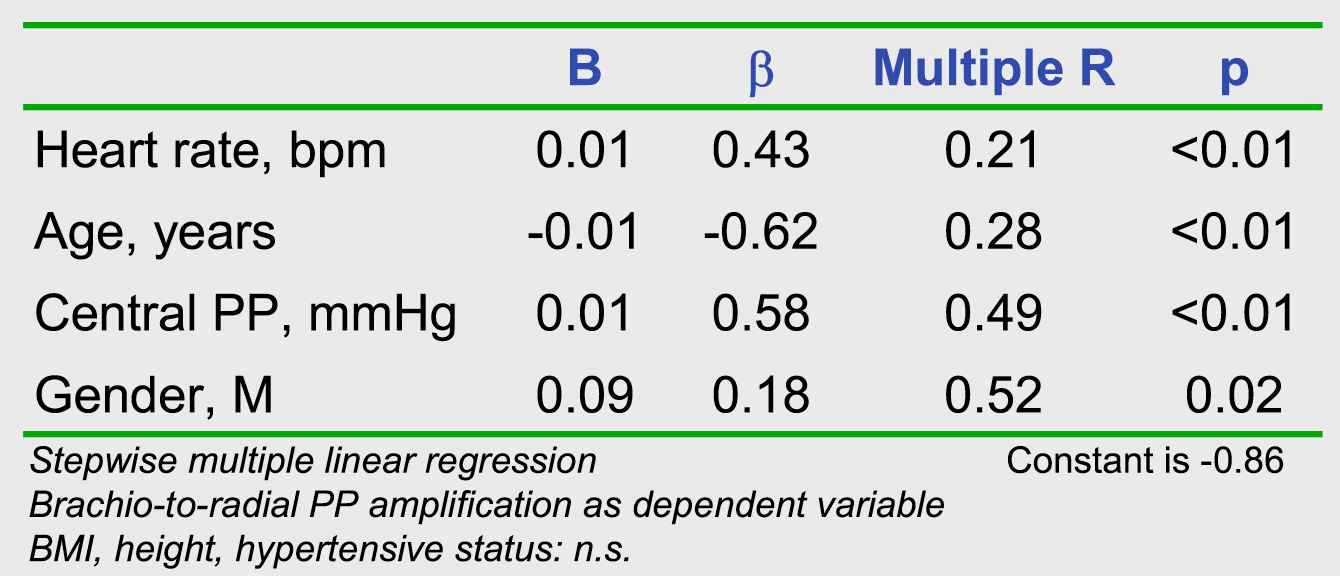P1.08 THE BRACHIO-TO-RADIAL PULSE PRESSURE AMPLIFICATION AND ITS CONTRIBUTION TO CENTRAL-TO-PERIPHERAL PULSE PRESSURE AMPLIFICATION
- DOI
- 10.1016/j.artres.2010.10.013How to use a DOI?
- Open Access
- This is an open access article distributed under the CC BY-NC license.
Pulse pressure amplification (PPa) is the phenomenon by which systolic blood pressure (SBP) increases from aorta to periphery, whether mean (MAP) and diastolic pressure (DBP) remain constant along the arterial tree. Controversy exist in defining the extent of brachio-radial PPa and how much it contributes central-to-peripheral PPa. The SphygmoCor estimates central PP (cPP) by a transfer function applied to the radial waveform calibrated to brachial SBP/DBP, or to brachial MAP/DBP. If brachio-radial PPa was irrelevant, calibrating radial waveform to bSBP/bDBP or to bMAP/bDBP would have no measurable impact on estimated cPP.
In order to assess brachio-radial PPa and its determinants, 93 healthy subjects (42±20 years, 53% men) were studied after 10 minutes of supine rest. Oscillometric bSBP/bDBP was used for brachial waveform calibration. Radial and brachial waveforms were consecutively obtained with applanation tonometry. Brachial MAP (bMAP) was derived from brachial tonometry by area method. Radial waveforms were calibrated to bSBP/bDBP and to bMAP/bDBP; cPP values were obtained for each calibration method, PPa was calculated as bPP/cPP, and brachio-radial PPa was the difference between the two PPa values.
On average, bSBP/bMAP/bDBP was 129/94/72±16/12/9mmHg. PPa was 1.42±0.25 when radial wave was calibrated to bSBP/bDBP, and 1.20±0.13 after calibration to bMAP/bDBP. Brachio-radial PPa was 0.22±0.17, and on average represented 52±18% of central-to-peripheral PPa. In a multivariate regression model, age, male gender, heart rate and cPP were all independent predictors of brachio-radial PPa.
Conclusions: Results suggest that brachio-radial PPa may represent a significant proportion of central-to-peripheral amplification. These findings require confirmation with invasive measurements.

Cite this article
TY - JOUR AU - G. Pucci AU - J. Cheriyan AU - L. Whittaker AU - S.S. Hickson AU - G. Schillaci AU - C.M. McEniery AU - I.B. Wilkinson PY - 2010 DA - 2010/12/02 TI - P1.08 THE BRACHIO-TO-RADIAL PULSE PRESSURE AMPLIFICATION AND ITS CONTRIBUTION TO CENTRAL-TO-PERIPHERAL PULSE PRESSURE AMPLIFICATION JO - Artery Research SP - 154 EP - 155 VL - 4 IS - 4 SN - 1876-4401 UR - https://doi.org/10.1016/j.artres.2010.10.013 DO - 10.1016/j.artres.2010.10.013 ID - Pucci2010 ER -
